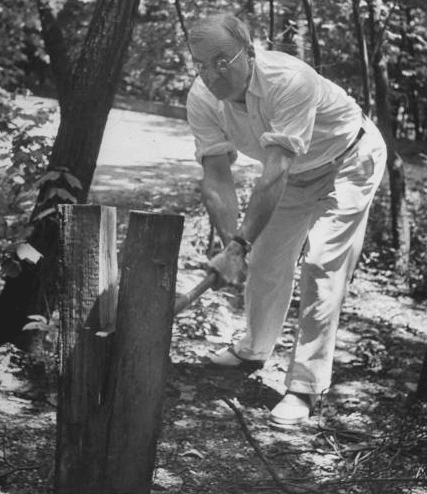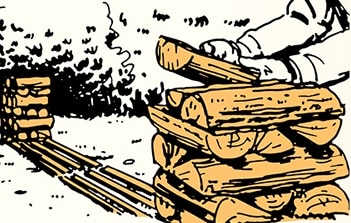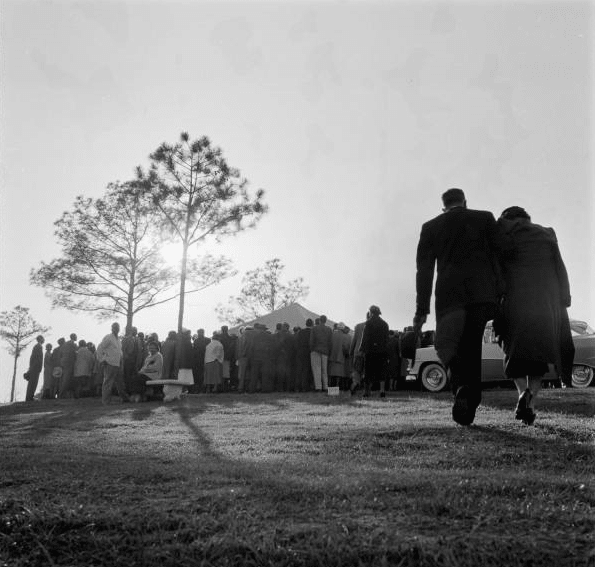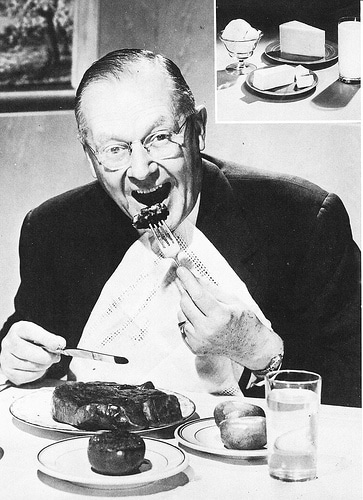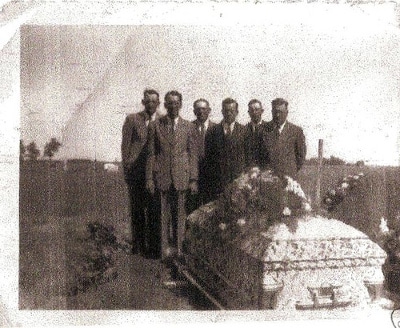
Editor’s note: This is a guest post from Nick Welch, a pastor who has worked in a funeral home doing removals (picking up the deceased from the place of death), assisting in embalming, preparing the deceased for burial & cremation, as well as meeting with families to make final arrangements for their loved one’s funeral.
“In this world nothing can be said to be certain, except death and taxes.” -Benjamin Franklin
There are many challenges that men of all backgrounds relish. Some are extreme: going on safari, a climbing expedition, or building a house. And some are a little more mundane: paying the mortgage, splitting and stacking a cord of wood, or winning a great hand of poker. All of these obstacles, however, have a satisfaction in their completion that gives a man a sense of accomplishment and joy. But one of the biggest challenges any man will ever face, the responsibility of making funeral arrangements for a loved one, often brings more pain and frustration than satisfaction. Making these arrangements carries quite a bit of stigma and not a little bit of confusion. But by making a few preparations, you can greatly mitigate the stress faced by you and your loved ones when dealing with this inevitable event.
“There is in the act of preparing, the moment you start caring.” -Winston Churchill
Planning Your Own Funeral
One of the reasons making funeral arrangements is so difficult is that we rarely take time to discuss with those closest to us what their wishes are. No one likes talking about the day they’ll be gone, but if we don’t, we leave some of the most important decisions that will need to be made in life (or death) to chance and unnecessarily burden our loved ones. So set the example by taking the initiative, planning your own funeral and sharing your plans with those closest to you. Here’s what you need to know to get started planning your funeral:
1. Visit Your Friendly Neighborhood Funeral Director
The internet is great for vast amounts of information, but it can’t empathize with you or have a cup of coffee with you. Make an appointment with a service counselor, funeral director or pre-arrangement specialist to talk about funeral options face to face. It will be a huge help in the decision making process. There are basically two types of funeral establishments: locally owned mom and pop shops or nationally owned, locally managed funeral homes. Which one to choose is a matter of personal opinion based on your own impressions. I know a lot of people in the death care industry who differ on which is better, but it all comes down to what you think. But a few of the things that you want to look for are these:
- An independent insurance holder instead of the funeral home “holding” the money for you. This basically means that there is a guarantee that the money will be there when you need it.
- Your pre-arrangements are transferable. This means that if you move from California to Florida or just a few hours away your arrangements move with you.
- Finally, but probably most importantly, make sure when all is said and done you feel like the people you choose to use for your final arrangements are people that you genuinely trust. Sometimes it just comes down to a gut feeling.
2. Don’t Commit…Just Yet
There’s no need to make a decision on the spot. Take the info, price lists, and service catalogues that you picked up at the funeral homes you visited to your wife, and if it’s appropriate, maybe even your kids. Set aside some time to talk about the different options, ask questions about the “what-ifs,” and come to a decision that seems the best to your family. You don’t need to put it off too long, maybe just a couple of weeks, but long enough to flesh it out, talk it out, and make a decision.
3. Speak Up
This is not a time to be reserved. Make sure those closest to you know exactly what plans you have made. In fact, most pre-arrangements you make with a funeral home will come with legal documents as well as a packet of info meant to be shared with those closest to you. Of course every family is unique in its comfort level with these kind of issues but come on, is there ever really a good time to talk about when dad dies? There’s no time like the present to take some of the sting out of the inevitable by putting it all on the table and talking about your plans. While it may be awkward to talk about now, knowing your wishes ahead of time will lighten your loved ones’ load when you pass on.
Bruce Preston, a family service counselor who spends his days helping people prepare for their death, says pre-arrangement takes care of the two biggest questions people have when a loved one passes away. “Did I do what my loved one wanted and did I do the right thing?” Guys, make sure you do the hard work of making these decisions easier for your wife and kids. The difference between doing it and not could mean thousands of dollars, hours spent filling out paperwork and a boatload of uncertainty and guilt. To wrap up the discussion on planning ahead, I’ll leave you with three reasons to pre-arrange according to Bruce Preston:
- It financially freezes the cost.
- It prevents emotional overspending.
- It takes the burden off of your loved ones.
Planning Someone Else’s Funeral
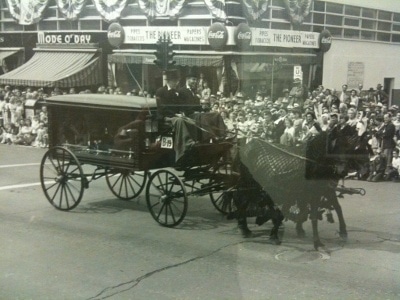
“Everyone has a plan ’til they get punched in the mouth.” -Mike Tyson
But what if you’re not the one who dies? What if you’re the one who has to make the arrangements for someone who hasn’t made them for themselves? Or worse yet, what if you thought the arrangements were all made only to have the rug pulled out from under you? Well, I’m glad you asked. First of all, don’t panic. No one expects you to have all the answers, but as a man you will be expected to get the answers. Here are some of the answers you’ll need.
Depending on the manner of death, you will likely be dealing with many different professionals who have specific duties. Long gone are the days of the undertaker on Main St. who measured your suit, built your box, and put you in it. In the case of an unexpected death you will be expected to contact the police who will contact the coroners. This isn’t because they think you did something wrong; it’s just procedure. Depending on what the coroner decides they will then release the body to the funeral home of your choice. It’s important to know that just because the body has been released to Bob’s funeral home doesn’t mean you have to use their services. If you choose to go down the street to Jim’s funeral emporium then you have every right to do so. Don’t be pressured into a situation you aren’t comfortable with. The funeral home’s primary responsibility is to care for your loved one with dignity and to treat you with compassion and honesty. If you doubt either of those things for any reason just explain that you will be going elsewhere to make the arrangements and would like to know what paperwork you need to fill out in order to make that happen.
Once you’ve decided what establishment you will use, you will be contacted by a funeral home employee, most likely a funeral arranger or director to make an appointment. At this appointment you will deal with everything from deciding the manner of disposition, i.e. burial or cremation, to what music and flowers you want at the service. Take it from me as someone whose job it was to meet with families and make funeral plans every day: there are a handful of things to keep in mind during the entire process. Here they are:
Don’t let too many cooks in the kitchen. Having a close-knit support system is important but when it comes time to go to the meeting, find out who needs to be there for legal purposes, designate who will be the representative, and have everyone else stay home. This makes the appointment run much smoother.
Do your homework. Even if there aren’t any pre-arrangements there may be insurance paperwork, financial documents, even military discharge papers that will come in handy at that meeting and provide much needed information that will help the funeral arranger. Plus having those items there helps minimize the potential that you will have to make another trip to the funeral home for any reason.
There is no free lunch and there are certainly no free funerals. Like it or not, the reality is that a funeral is one of the largest single expenses you will have to deal with in life. While the type of services offered vary immensely there are some constants. There are fees for transportation, refrigeration, and clerical as well as fees imposed by the state and local governments for things like disposition permit, death certificate, and the like. These fees alone can potentially reach into the hundreds of dollars.
“Do, or do not. There is no try.” -Master Yoda
Disposition of the Body
So you’ve come to the point where a decision must be made regarding disposition. The choice here is typically between the body being buried in a traditional fashion or cremated. Many faith backgrounds, cultures, or even societal pressures may hold one of these options taboo, in which case the answer will be fairly simple. But for argument’s sake let’s imagine that either one is a viable possibility. If you were fortunate enough to have had a conversation with your loved one then this decision is a slam dunk. But let’s assume that you have no clue as to what their wishes, if any, may have been. There are many options but here are the most common:
Traditional Burial. This usually includes embalming, a viewing, a chapel or church service, followed by a graveside service along with a reception following. This is the stereotypical funeral that pops into many of our minds because of books, tv shows, or movies that we have seen. In reality, this style of funeral is becoming less popular nowadays for many reasons, not the least of which is financial. These funerals can be expensive, real expensive. On average, a traditional funeral with burial costs somewhere in the neighborhood of $10k-$12k. These prices, like all funeral prices, rise an average of 17% a year and are more expensive on the East coast versus out West.
Cremation/Burial. This plan seems to be a good fit for families that want to scale back a bit on the cost and formal nature of a more elaborate service option but still want a sense of tradition. It can include a viewing and even an open casket with the cremation following the service. The urn can then be buried with the same ceremonial importance and value of a traditional casket burial.
Basic Cremation. The name pretty much says it all. Many times because of financial reasons or just the desire for simplicity, a basic cremation is chosen. Usually this option does not include embalming, a viewing, or burial. Many times the ashes, or more technically, the cremains are kept at home or disposed of in a more personal way. A chapel service is usually dispensed with in favor of a less formal and traditional service facilitated by the family in a home or church. This option is usually the least expensive but in no way less valuable. In fact, in many areas of the country this option is actually the most popular both in pre-arranging and at need funeral preparation.
Green Burial. Green burial is fairly new but beginning to gain ground as an alternative to many of the more common funeral plans. Bodies are buried without embalming fluid and are placed in a biodegradable casket or simple shroud, and the burial area is kept in a natural, non-landscaped or manicured state. It’s an environmentally friendly way of returning the organic compounds of the body back to the soil in a decent and respectful manner as well as what supporters call “a return to ancient and time honored funeral rites.” While this method is gaining popularity, its availability is still limited and will require a bit more research and investigation on your part.
Remember, in all of these options the two most important rules are: Did I do what my loved one wanted? And, did I do the right thing? If you can feel confident and satisfied with your answer to these questions then rest assured that you have done well and served the memory of your loved one in an honorable way.
Peace & Rest, Nick



